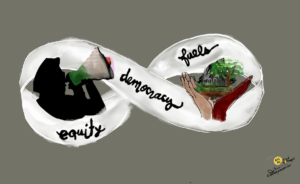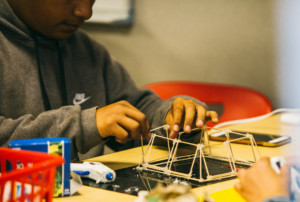Politics and Pundits
The best advocate for kids in America, Joel Klein, former NYC chancellor, closed the ASU Education Innovation Summit (#EIsummit). Klein is convinced that education is the most important issue this country faces and that the fountain of incrementalism won’t work for our kids or our nation.
A few months into his new role at News Corp, Joel opened his discussion with Marguerite Kondracke with three observations:
1. Innovation doesn’t happen with monopoly providers—it can’t and won’t. Joel noted that everyone at the summit demands educational choice but assign income families to a school. The neediest kids deserve options just like affluent kids.
2. We must professionalize teaching. Joel said it rubbed him the wrong way working in an environment where excellence did not matter—a pension and seniority driven system where people did not think about getting better every day.
3. Education reform is not sufficient—the delivery system is broken. Joel points to the 2.5x increase in investment and 75% increase in staffing over the least three decades with no improvement in results. “If you don’t change the delivery system, you won’t get different results.”
Joel continued, “The system works the way it was designed, life time tenure, unmatched pension benefits, and a raise for working every year” and a “real college ready graduation rates of about 35%.” Klein is convinced that it’s a national security risk “if we have smaller entrepreneurial class and larger working class.”
Joel was very complementary of Jeb Bush’s “heroic leadership” in Florida and now nationally (through Foundation for Excellence in Education and Digital Learning Now). And speaking of leadership, a big part of Klein’s legacy is an extraordinary cohort of leaders now leading reform in other cities: John White, Chris Cerf, Andres Alonso, Garth Harries, and JC Brizard (to name a few).
Kondracke asked Klein about what’s next from News Corp. Joel discussed the learning transformation to come and the five key drivers:
1. The shift print to digital: dynamic and interactive instructional content is coming fast.
2. Data driven system: with digital learning and more instant feedback, we can try a dozen lessons and see what works best, test empirically whether fractions should come before decimals or whether it matters whether physics comes before biology. Klein thought Wireless Generation (a News Corp company) was well positioned in this regard.
3. The shift from classroom-centric to device-centric learning unbound by time and place.
4. Customization by level and approach.
5. Human capital: the ability to focus on the value-added and really inspirational part of learning, and not asking every one to do the same stuff (like build lesson plans).
Joel mentioned The Race Between Education and Technology, Katz and Goldin, and Special Interest, Terry Moe’s new book, as two important reads. He thought they illustrated why we need to be disruptive—because the future won’t be kind.
Klein’s advice on innovation, ”Hold on to big dreams, find someone to fund them, and have as few meetings as possible.”
Politics, Pundits, and Poor Schools. Carols Watson, Goldman Sachs, moderated a panel of education reformer that kicked off the second day at Sky Song.
Jon Hage, Charter Schools USA, has quietly built a large high performing school network across Florida. Hage is an organizer and recently played an instrumental role in restarting Florida Charter School Alliance. Like National Heritage and Mosaica, CSUSA has rehabilitated the image of for-profit school management companies. Hage’s results give him some political capital in Tallahassee.
Adrian Fenty, former mayor of Washington DC said, “The results speak for themselves,”about the Rhee agenda, “After three years there was dramatic improvement in all indicators.” But Fenty lost a close election last year—a case where Rhee and Fenty spent more political capital was spent than was in the bank.
Ron Huberman, former CEO of Chicago Public Schools sought to explod three common myths:
1. More money will fix the problem: we’ve proven that spending more doesn’t improve outcomes.
2. Reformers will win the ground fight: that will never happen. Families (and organizers themselves) have been poorly served for decades and don’t have expectations for dramatically better schools.
3. The problems are all on the teachers union: a flawed governance structure is a more fundamental problem
Ron suggests we need massive change forced top down. Schools should win the right to educate children based on a track record of performance. Bad schools should be closed and replaced. “Unless we address these we’ll be in the land of incrementalism.” Huberman said “It’s not the money, it’s not the unions,” and “it’s about leadership.”
Huberman’s call for aggressive top down reforms drew applause from the audience of edupreneurs but aggressive reforms take political capital. Klein and Huberman had the opportunity to work under mayoral control with mayors that had some political capital that they were willing to spend on a strong reform agenda.
Phil Handy, former state board chair in Florida, noted that aggressive reform takes political support and political support costs money. Phil also pointed out that key state key chief positions open in , Florida, Colorado, and Ohio.
The key takeaway from these bookend sessions that opened and closed day two at Sky Song is that we need aggressive reforms—in fact we need to replace an obsolete system with web of personal digital learning opportunities. This massive and historic shift will require a great deal of political capital to overcome a resilient system.








0 Comments
Leave a Comment
Your email address will not be published. All fields are required.